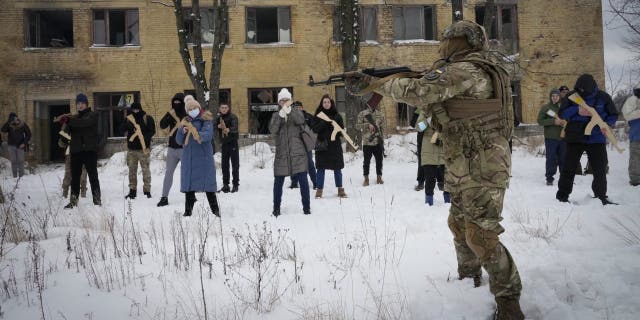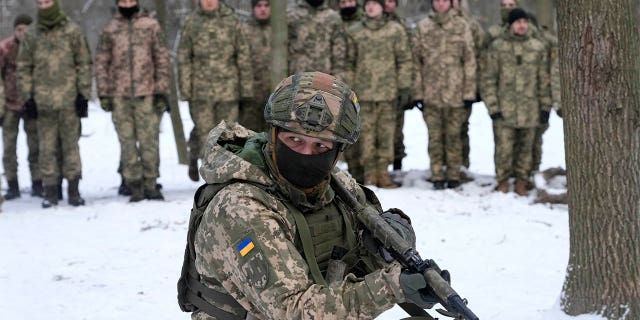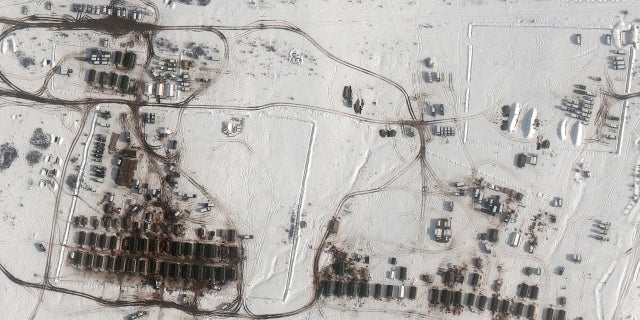State Department validates leaked documents responding to Russian demands, US holds firm on blanket NATO ban

Biden orders 3,000 troops to deploy to Eastern Europe amid Russia-Ukraine conflict
White House correspondent Peter Doocy reports the latest on the announcement.
The State Department on Wednesday validated the authenticity of documents leaked to the press that revealed Washington’s response to Russian demands in exchange for de-escalating tensions with Ukraine.
“I have seen nothing to suggest these documents are not authentic,” State Department press secretary Ned Price told reporters. “We did not make these documents public but now that they are we can confirm what we’ve always said – we are untied with our NATO allies in our resolve to engage in an open, constructive, serious set of diplomatic engagements.”
Local residents train close to Kyiv, Ukraine, Sunday, Jan. 30, 2022. Russia’s foreign minister claims that NATO wants to pull Ukraine into the alliance, amid escalating tensions over NATO expansion and fears that Russia is preparing to invade Ukraine.
(AP Photo/Efrem Lukatsky)
The written responses by the U.S. and NATO were first obtained by El Pais after being submitted to the Russian Federation last week.
The State Department had remained mum on negotiations it laid out in response to Russian President Vladimir Putin’s demands which included a blanket ban on Ukraine’s ability to join the 30-member alliance and the placement of strategic strike weapons.
The U.S. and NATO once again flatly rejected the Kremlin’s calls for an admission ban on the former Soviet nation but said it would be willing to negotiate troop and missile deployment.
“The door remains open to discuss the ideas that are in this document,” Price said. “Those ideas are not spelled out in terms of what it would look like in practice – how it would be executed.
“But it needs to be a discussion that takes place in the context of deescalation,” he added.
El Pais, a Spain-based publication, did not disclose how it received the documents but reported that the U.S. rejected Russian demands to enter into a bilateral agreement on security in Europe.
An instructor trains members of Ukraine’s Territorial Defense Forces, volunteer military units of the Armed Forces, in a city park in Kyiv, Ukraine, Saturday, Jan. 22, 2022. Dozens of civilians have been joining Ukraine’s army reserves in recent weeks amid fears about Russian invasion.
(AP Photo/Efrem Lukatsky)
Washington and its NATO allies did propose several options to negotiate arms agreements and a “transparency mechanism” which would reveal where some “missile-launching bases” are located in NATO allied nations like Romania and Bulgaria as well as in Russia.
The U.S. chided Moscow for breaking the Intermediate-Range Nuclear Forces (INF) Treaty with its production of SSC-8 missiles, ground-launched cruise missiles, which prompted the U.S. to pull out of the 1987 agreement in 2019.
But Washington did agree to enter into “bilateral conversations” with Moscow regarding short and long-range missiles – potentially paving the way for new disarmament agreements.
Price said the U.S. and NATO are still awaiting Russia’s response to the document, but the spokesman told reporters the Russian Foreign Ministers Sergey Lavrov appeared to indicate “that there will be an opportunity…for further diplomatic engagement.”
Russian officials have repeatedly claimed it is not preparing for an invasion into Ukraine, despite its buildup of more than 120,000 troops along Ukraine’s border – a move that echoes steps taken prior to the 2014 incursion.
Tents, shelters and deployments are seen at a training ground in Angarsky, Crimea, on Tuesday.
(AP/Maxar Technologies)
Putin has accused the U.S. of ramping up hysteria surrounding the threat of an invasion – which the State Department rejected Wednesday.
“This is their playbook, to turn the reality upside down,” Price said. “We are not optimistic, neither are we pessimistic. We’re clear-eyed about the stakes.”
Source: Read Full Article




